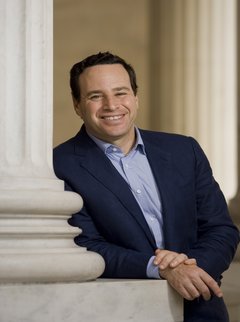[Editor's note: The Winnipeg Jewish Review is reprinting four recent articles by David Frum, author, political commentator, and former special assistant to President George W. Bush, 2001-2002 who is this year’s Distinguished Sol and Florence Kanee Lecturer for the Jewish Heritage Centre of Western Canada. Frum’s lecture “Is Time Running Out for Israel?” takes place Thursday, April 28 at the Shaarey Zedek Synagogue at 8 pm.]
LIBYA AND YEMEN: THE NEXT AL QAEDA STRONGHOLDS?
By David Frum , March 23, 2011 Originally published in The Week
Question: Why are we in Afghanistan?
Answer: To prevent al Qaeda from reestablishing its safe havens in that country.
Q: Why did al Qaeda choose Afghanistan for its safe havens?
A: Because the local government, the Taliban, allowed al Qaeda to operate freely in their territory.
Q: What if some other government made the same offer? Could al Qaeda relocate?
A: Sure. In the mid-1990s, Osama bin Laden based himself in Sudan. Al Qaeda has also operated in Somalia and Yemen.
Q: Is it realistic to worry that al Qaeda might move?
A: Very realistic. In fact, many people think that al Qaeda has already given up on Afghanistan.
Q: Where might al Qaeda go?
A: Theoretically, anywhere in the Islamic world where the local government does not take decisive action against them.
Q: Yemen?
A: Yes, very much so. In fact, some believe Yemen has already replaced Afghanistan. And of course, if Yemen’s Western-oriented government collapses, the country might become even more hospitable to al Qaeda.
Q: I’ve noticed that quite a lot of governments are collapsing all over the Arab world. Could that collapse create opportunities for al Qaeda in Egypt? In Libya?
A: It would depend. For now, the Egyptian government continues to function, and continues to cooperate with the United States.
Q: But that could change, right? If, for example, a radical Islamist government took over?
A: Let’s hope not. But yes. A Muslim Brotherhood government in Egypt might choose to look the other way if al Qaeda set up operations in Cairo — the same way the Syrians look the other way from Hamas operations in Damascus.
Q: Could radical Islamists take over in Libya?
A: Libya is not a country that can be “taken over” the way Egypt can. Egypt is a very organized society. Seize power at the top, and the government keeps functioning. It just follows new orders. But Libya is just an agglomeration of tribal pieces that the Italians assembled into a colony 100 years ago. Absent the dictatorial Moammar Gadhafi, Libya could disintegrate into a Somalia with money.
Q: Wait a minute. You just mentioned Somalia as a place where al Qaeda operates. If Libya breaks apart, could al Qaeda find a home there?
A: Yes indeed. When Iraq descended into civil war, local Sunni radicals organized themselves into an al Qaeda of Iraq. Many Libyans traveled to Iraq to fight with them, against the Americans. So yes, the potential is there.
Q: That would be a big, big problem, wouldn’t it?
A: You mean to have al Qaeda terror cells operating in a huge, disorganized territory a short boat ride across the Mediterranean from Italy? Yes, that qualifies as a huge problem.
Q: Is it possible that we have defined our strategic problem incorrectly? President Obama has put 100,000 Americans into Afghanistan in order to deny al Qaeda a base in that one country. But maybe our strategic problem is to deny al Qaeda a base in any country?
A: You could put it like that.
Q: Which would mean that concentrating so much American force in one place — and such a remote place — risks missing larger and nearer dangers in places like Libya and Yemen?
A: The usual answer to that is “We can walk and chew gum at the same time.”
Q: Is that a good analogy?
A: No.
OBAMA'S LIBYAN "MISSION ACCOMPLISHED" MOMENT
By David Frum, March 28th, 2011 originally published on www.frumforum.com
“I hope you are not merely pretending to be wicked, while being secretly good. That would be hypocrisy.”
As written and delivered, President Obama’s speech on Libya was preposterous.
We intervened in the midst of somebody else’s civil war. We saved one side from losing, prevented another side from winning. Now we’re declaring “mission accomplished” in the middle of the battle. If the president’s message is taken seriously, he has exposed us to the resentment and revenge of one side, while failing to earn the gratitude of the other. If the president’s message is taken seriously, America’s goals in Libya were to perpetuate an ongoing civil war without achieving any stable end-state.
The optimistic interpretation of the president’s speech is that he was engaging in a little statesmanlike hypocrisy.
The optimistic interpretation is this:
“My fellow Americans. I attach great importance to the endorsement of the so-called international community. The UN Security Council Resolution authorized NATO to stop Qaddafi. Qaddafi is stopped. I recognize as well as you that this is a dangerous and untenable status quo. Don’t worry, it won’t be the status quo for long. We’re working now with diplomacy, with covert operations and with the threat of the resumption of force to persuade those around Qaddafi to overthrow and kill him. And of course the French and the British are still waging war. Qaddafi’s time will be short. When that time ends, we’ll pretend to be totally surprised. Who us? Responsible? Oh no – we were just enforcing a no-fly zone.”
The pessimistic interpretation is that the president means what he says – that he thinks his mission stops at freezing some dividing line between warring Libyan factions and leaving somebody – NATO? the UN? – to police that line for weeks, months, maybe years to come.
I’d like to believe the optimistic scenario. But there are warning signs here that the pessimistic is more plausible. The most ominous of the warning signs was his comment about Iraq. Why reargue that war now? Answer: to justify cutting short the commitment to Libya. Obama’s problem is that the moment to take that position was before the Libyan intervention. If he truly did not think the outcome in Libya mattered – if he had been willing to live with a Qaddafi victory – then he could have hung back and allowed events to proceed. But having committed American power to the war, he committed America inescapably to the outcome. If that outcome is a divided, war-torn country, President Obama will not escape responsibility because he only used American airpower. And if he truly is haunted by a determination not to repeat the Iraq war of 2003, he needs to remember that America won itself few friends with its indefinite policing and punishing of Iraq in the 1990s.
HOW OBAMA MISHANDLED THE UN SETTLEMENT VOTE
by David Frum, February 19th, 2011 originally at www.frumforum.com
Elliott Abrams at the Council of Foreign Relations has written an important statement on Friday’s Obama administration goings on at the UN. It’s both back story and detailed rebuttal. Please read, it’s reproduced below in full.
"How to Lose Friends and Not Influence People"
by Elliott Abrams
The Obama Administration cast its first veto in the United Nations on Friday, February 18, killing a Security Council resolution that would have condemned Israeli settlement activity. Its poor handling of the entire episode has left just about everyone angry at the United States, and is therefore a manifest failure of American diplomacy.
The Palestinian Authority began to talk about this resolution months ago. The United States could then have adopted a clear position: put it forward and it will be vetoed. That very clear stand might have persuaded the Palestinian leaders and their Arab supporters to drop the effort early on, when it could have been abandoned with no loss of face. Instead the Administration refused to make its position clear until the final day. In its Friday edition the New York Times was reporting that “the Obama administration was trying Thursday evening to head off an imminent vote in the United Nations Security Council that would declare Israel’s settlement construction in the West Bank illegal, but would not declare publicly whether it was prepared to veto the resolution.” It seems clear that the Administration was desperate to avoid a veto, indeed desperate to go four years without spoiling its “perfect record.” But a “perfect record” in the UN requires vetoes, given the persistent anti-Israel bias of the organization. The Administration’s desire to avoid vetoes only served to reduce its bargaining power, for the credible threat of a veto has long served American diplomats seeking to achieve an outcome more favorable to our interests.
On the last day before the vote, the President called Palestinian President Mahmoud Abbas. The Israeli press reported that “In a 50-minute phone call, he asked Abbas to drop the resolution and settle for a non-binding statement condemning settlement expansion, Palestinian officials said. Abbas on Friday received a follow-up call from Secretary of State Hillary Clinton on the issue, the Palestinian news agency Wafa said.” But apparently the President did more than ask: “One senior Palestinian official, speaking on condition of anonymity, said the offer, made in an hour-long phone call from Obama, was accompanied by veiled threats of ‘repercussions’ if it were refused.
‘Obama threatened on Thursday night to take measures against the Palestinian Authority if it insists on going to the Security Council to condemn Israeli settlement activity, and demand that it be stopped,’ the official said. ‘There will be repercussions for Palestinian-American relations if you continue your attempts to go to the Security Council and ignore our requests in this matter, especially as we suggested other alternatives,’ the official quoted Obama as telling Abbas.”
Abbas rejected the Clinton and Obama appeals and/or ignored their threats, in itself a sign of reduced American diplomatic influence. The American veto will have angered Palestinians even more. But it will not have gained the Administration any thanks from Israel or from supporters of Israel in the United States, who were appalled by the Administration’s search for a bad compromise. According to the New York Times, the Administration proposed that instead of a resolution the Security Council issue a “presidential statement” that “would condemn settlements but also call on all sides to resume negotiations. That statement would be paired with a Russian proposal for a fact-finding mission on settlements, and a proposed change in how the quartet, the international group that deals with the Middle East peace process, defines the basic building blocks of negotiations ranging from borders to the political status of Jerusalem.”
So the Administration was content with condemning settlements, happy to establish a new UN fact-finding mission, and willing to redefine the role of the Quartet. All that just to avoid a veto of the sort American presidents have been ordering for decades.
Feeling guilty about its veto the Administration then issued an extraordinary “explanation of vote,” read by UN Ambassador Susan Rice. Though we had to veto, she explained, “we reject in the strongest terms the legitimacy of continued Israeli settlement activity. For more than four decades, Israeli settlement activity in territories occupied in 1967 has undermined Israel’s security and corroded hopes for peace and stability in the region. Continued settlement activity violates Israel’s international commitments, devastates trust between the parties, and threatens the prospects for peace….While we agree with our fellow Council members—and indeed, with the wider world—about the folly and illegitimacy of continued Israeli settlement activity, we think it unwise for this Council to attempt to resolve the core issues that divide Israelis and Palestinians. We therefore regrettably have opposed this draft resolution.”
This is amazing language for a diplomat: “folly,” “illegitimacy,” “devastates,” “corroded,” and so on. It’s hard to recall such a vehement statement against Israel, nor one that contains so many conclusions that are, to say the least, highly debatable. Has construction in and around Jerusalem or in Ma’ale Adumim, for example, “undermined Israel’s security?” Given that the Israelis and Palestinians concluded the Oslo Accords and the numerous other agreements while construction activity was far greater than it is today, what is the basis for saying that it “devastates trust?” No doubt the Administration decided that as it had vetoed it would “make it up” to the Arabs with this statement. But emotive language such as Amb. Rice employed serves no purpose. Arab newspapers will headline the veto—assuming of course that they have space in their pages tomorrow after covering the revolts in Tunisia, Yemen, Algeria, Libya, Bahrain, and Egypt—and are very unlikely to cover her speech. Only Israelis and supporters of Israel in the United States will study her language, and remember it.
So, the Administration emerges having damaged relations with both the Israelis and the Palestinians. Decades of American experience at the United Nations proves clearly the “folly” of such diplomatic action, which “devastates trust” in the United States and therefore “corrodes hopes for peace and stability in the region.” Next time, say you’ll veto, veto, and leave it at that. The United States will end up with fewer angry friends and fewer gleeful enemies.
THE NEWEST CELEBRITY: THE DICTATOR'S WIFE
by David Frum , March 18th, 2011 originally published at www.frumforum.com
Remember when Saif Qaddafi was a bold promising reformer, feted by the London School of Economics and Dr. Benjamin Barber, the self-described “internationally renowned political theorist”?
Everybody learned their lesson from that disaster, right?
Well – not everybody.
Chrystia Freeland reports in the International Herald Tribune today about the global celebration of Asma al-Assad, wife of the Syrian dictator, Bashar al-Assad:
Asma al-Assad, was the subject of a glowing profile in the March issue of the U.S. edition of Vogue, which described this “rose in the desert” as “the freshest and most magnetic of first ladies” and reported on the “wildly democratic principles” that govern family life chez Assad. Now, the Harvard Arab Alumni Association has organized an event in Damascus, “under the patronage” of Mrs. Assad, who was scheduled to deliver a keynote address on Thursday.
On Wednesday, the day before the planned Harvard alumni event, security officers beat and detained a group of nonviolent demonstrators who gathered to call for the release of the estimated 3,000 to 4,000 political prisoners in the country.
On its Web site earlier this week, the Harvard Arab Alumni Association highlighted its connection with the dictator’s wife: “We are greatly honored to hold our Arab World Conference under the esteemed patronage of Her Excellency Mrs. Asma al-Assad, The First Lady of Syria, and are privileged that Her Excellency will deliver the conference’s keynote address. A thought-provoking, inspiring and tireless leader and advocate, the First Lady’s address will certainly be the highlight of our event.”
HOW OBAMA MISHANDLED THE UN SETTLEMENT VOTE
February 19th, 2011 originally at www.frumforum.com
Elliott Abrams at the Council of Foreign Relations has written an important statement on Friday’s Obama administration goings on at the UN. It’s both back story and detailed rebuttal. Please read, it’s reproduced below in full.
"How to Lose Friends and Not Influence People"
by Elliott Abrams
The Obama Administration cast its first veto in the United Nations on Friday, February 18, killing a Security Council resolution that would have condemned Israeli settlement activity. Its poor handling of the entire episode has left just about everyone angry at the United States, and is therefore a manifest failure of American diplomacy.
The Palestinian Authority began to talk about this resolution months ago. The United States could then have adopted a clear position: put it forward and it will be vetoed. That very clear stand might have persuaded the Palestinian leaders and their Arab supporters to drop the effort early on, when it could have been abandoned with no loss of face. Instead the Administration refused to make its position clear until the final day. In its Friday edition the New York Times was reporting that “the Obama administration was trying Thursday evening to head off an imminent vote in the United Nations Security Council that would declare Israel’s settlement construction in the West Bank illegal, but would not declare publicly whether it was prepared to veto the resolution.” It seems clear that the Administration was desperate to avoid a veto, indeed desperate to go four years without spoiling its “perfect record.” But a “perfect record” in the UN requires vetoes, given the persistent anti-Israel bias of the organization. The Administration’s desire to avoid vetoes only served to reduce its bargaining power, for the credible threat of a veto has long served American diplomats seeking to achieve an outcome more favorable to our interests.
On the last day before the vote, the President called Palestinian President Mahmoud Abbas. The Israeli press reported that “In a 50-minute phone call, he asked Abbas to drop the resolution and settle for a non-binding statement condemning settlement expansion, Palestinian officials said. Abbas on Friday received a follow-up call from Secretary of State Hillary Clinton on the issue, the Palestinian news agency Wafa said.” But apparently the President did more than ask: “One senior Palestinian official, speaking on condition of anonymity, said the offer, made in an hour-long phone call from Obama, was accompanied by veiled threats of ‘repercussions’ if it were refused.
‘Obama threatened on Thursday night to take measures against the Palestinian Authority if it insists on going to the Security Council to condemn Israeli settlement activity, and demand that it be stopped,’ the official said. ‘There will be repercussions for Palestinian-American relations if you continue your attempts to go to the Security Council and ignore our requests in this matter, especially as we suggested other alternatives,’ the official quoted Obama as telling Abbas.”
Abbas rejected the Clinton and Obama appeals and/or ignored their threats, in itself a sign of reduced American diplomatic influence. The American veto will have angered Palestinians even more. But it will not have gained the Administration any thanks from Israel or from supporters of Israel in the United States, who were appalled by the Administration’s search for a bad compromise. According to the New York Times, the Administration proposed that instead of a resolution the Security Council issue a “presidential statement” that “would condemn settlements but also call on all sides to resume negotiations. That statement would be paired with a Russian proposal for a fact-finding mission on settlements, and a proposed change in how the quartet, the international group that deals with the Middle East peace process, defines the basic building blocks of negotiations ranging from borders to the political status of Jerusalem.”
So the Administration was content with condemning settlements, happy to establish a new UN fact-finding mission, and willing to redefine the role of the Quartet. All that just to avoid a veto of the sort American presidents have been ordering for decades.
Feeling guilty about its veto the Administration then issued an extraordinary “explanation of vote,” read by UN Ambassador Susan Rice. Though we had to veto, she explained, “we reject in the strongest terms the legitimacy of continued Israeli settlement activity. For more than four decades, Israeli settlement activity in territories occupied in 1967 has undermined Israel’s security and corroded hopes for peace and stability in the region. Continued settlement activity violates Israel’s international commitments, devastates trust between the parties, and threatens the prospects for peace….While we agree with our fellow Council members—and indeed, with the wider world—about the folly and illegitimacy of continued Israeli settlement activity, we think it unwise for this Council to attempt to resolve the core issues that divide Israelis and Palestinians. We therefore regrettably have opposed this draft resolution.”
This is amazing language for a diplomat: “folly,” “illegitimacy,” “devastates,” “corroded,” and so on. It’s hard to recall such a vehement statement against Israel, nor one that contains so many conclusions that are, to say the least, highly debatable. Has construction in and around Jerusalem or in Ma’ale Adumim, for example, “undermined Israel’s security?” Given that the Israelis and Palestinians concluded the Oslo Accords and the numerous other agreements while construction activity was far greater than it is today, what is the basis for saying that it “devastates trust?” No doubt the Administration decided that as it had vetoed it would “make it up” to the Arabs with this statement. But emotive language such as Amb. Rice employed serves no purpose. Arab newspapers will headline the veto—assuming of course that they have space in their pages tomorrow after covering the revolts in Tunisia, Yemen, Algeria, Libya, Bahrain, and Egypt—and are very unlikely to cover her speech. Only Israelis and supporters of Israel in the United States will study her language, and remember it.
So, the Administration emerges having damaged relations with both the Israelis and the Palestinians. Decades of American experience at the United Nations proves clearly the “folly” of such diplomatic action, which “devastates trust” in the United States and therefore “corrodes hopes for peace and stability in the region.” Next time, say you’ll veto, veto, and leave it at that. The United States will end up with fewer angry friends and fewer gleeful enemies.
WHAT DOES BAHRAIN'S TURMOIL MEAN FOR IRAN?
by David Frum, February 19th, 2011 Originally published in the National Post.
Bahrain is an island nation in the Persian Gulf, connected by a causeway to Saudi Arabia.
Bahrain has been swept by protests against the ruling family — protests that have been met by lethal repression.
Bahrain looks a modern, prosperous country. Relatively poor in energy resources, Bahrain has diversified into refining, services, banking. Yet oil still provides 60% of the state budget: A revenue source that has enriched the Sunni ruling class, even as the country’s Shiite majority struggles with chronic underemployment.
Bahrain also happens to be the base of the U.S. Fifth Fleet.
The obvious thing to worry about in Bahrain is that the current unrest could invite meddling by fellow Shiites across the Gulf in Iran. (And in fact Iran has meddled in Bahrain since the days of the shah.)
But let’s try some thoughts that are less obvious.
- People should be careful about assuming that Arab speaking Shiites will cheerfully submit to domination by Persian-speaking Shiites. Especially when the particular Arab-speaking Shiites live in a country that is freer, richer and generally more fun than Persia.
Bahrain is a rich place, GDP per capita of over $28,000 according to the World Bank. That figure puts Bahrain in the same neighborhood as Israel. Bahrain is seven times richer than Iran.
Bahrain educates its women: women are almost exactly as likely as men to finish high school, according to the UN Human Development Index. (In Iran, women are only about two-thirds as likely as men to finish high school.)
- By the numbers, Bahrain meets more of the preconditions for democracy.
Bahrain is 12 times richer than Egypt. One in seven Egyptians cannot read. In Bahrain literacy is virtually universal. According to the Pew survey of Muslim belief, 84% of Egyptians believe that apostates from Islam should be killed, 82% believe that adulterous women should be stoned to death, and 77% believe that thieves should have their hands cut off. The only other major Muslim country to report anything like such fundamentalist attitudes is Pakistan.
In Bahrain, women vote and drive. Hijab is not required. Alcohol may be legally sold. Bahrain’s ambassador to the United States is a Jewish woman who previously served in the country’s elected legislature and headed the local branch of Human Rights Watch. OK, that last part is probably just a stunt. Still–an interesting stunt.
- Bahrain’s royal form of government opens the way to compromise: more representation and power to the elected legislature, while reserving national security issues to the hereditary executive. You might call this the “French” constitutional model. Such a model could help resolve a lot of concerns in Egypt too, where the Muslim Brotherhood could conceivably win the largest block of seats in a freely elected Parliament — but likely lacks the clout to defeat an incumbent president backed by the Egyptian military.
- Precisely because Bahrain is so closely tied to the West, the West cannot keep quiet about violent repression in Bahrain. This is not Egypt: An ally, but ultimately a country at an arm’s-length relationship to the western world. An entire American carrier battle group is based in Bahrain — there is no way the United States can avoid being implicated in the actions of the Bahraini government.
And given that the West is pressing so hard for democracy in the Shiite-majority country across the water, indifference in Bahrain invites damaging accusations of opportunism and hypocrisy.
Always and ever: Iran is the big play in the Middle East. A democratic Iran may not be an entirely congenial presence. Persia was once a great world empire, and many Iranians might well vote for nationalist politicians in a free election. But a more democratic Iran would be a less dangerous place for everyone, including its own people, than today’s theocratic, terrorism-supporting Iran. Every regional decision has to be measured against the test: Is this moving us closer to — or further from — a positive change in the Iranian political system?
That test should guide decisions about Bahrain, and about a lot more than Bahrain.













































































































































